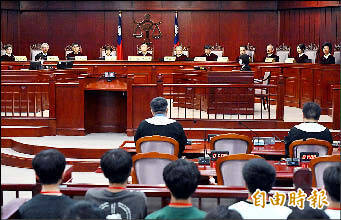《TAIPEI TIMES》 Constitutional Court draft flawed, Judicial Yuan says

Grand justices preside over a hearing at the Constitutional Court in Taipei in an undated photograph. Photo: Liao Chen-huei, Taipei Times
SUPPORT: The KMT chairman said passing a constitutional amendment at the legislature requires a three-quarters majority, and the same principle should apply to the court
By Chen Cheng-yu and Esme Yeh / Staff reporter, with staff writer
The Judicial Yuan on Saturday said draft amendments to the Constitutional Court Procedure Act (憲法訴訟法) proposed by Chinese Nationalist Party (KMT) Legislator Weng Hsiao-ling (翁曉玲) could harm people’s right to seek constitutional relief.
Weng yesterday said the Judicial Yuan misinterpreted her draft.
The exchanges were made ahead of the draft’s review at the legislature’s Judiciary and Organic Laws and Statutes Committee today.
The Judicial Yuan said Weng’s proposed amendments to Article 4 of the act might virtually cripple the authority of grand justices to interpret the Constitution.
Weng in the previous legislative session drafted an amendment specifying that “the total number of incumbent grand justices” referred to in the act is defined as “15” as stipulated in Article 5 of Additional Articles of the Constitution of the Republic of China (中華民國憲法增修條文).
In the current legislative session, she motioned another proposal to the act, which would raise the threshold for passing a ruling of constitutional interpretation from a simple majority to two-thirds of the judges.
That means it would require a quorum of at least 10 grand justices attending constitutional interpretation proceedings and at least seven agreeing on the ruling to make a judgement, if both draft amendments are passed by the legislature, the Judicial Yuan said.
Grand justices must be nominated by the president and approved by the Legislative Yuan to be sworn in and perform their duties, it said.
However, there are no mechanisms to extend an incumbent justice’s term or to offer a temporary appointment, it said, adding that a vacancy arises when a justice resigns or passes away.
The grand justices would in practice be unable to initiate constitutional interpretation proceedings and pass a ruling if the incumbent personnel are fewer than 10 people, especially when the nomination and legislative review process is delayed, according to the draft amendments, it said.
It also cited Article 12 of the Constitutional Court Procedure Act as specifying that grand justices recusing themselves from a case in accordance with the act “will not count towards the total number of incumbent justices.”
That means when grand justices refrain from a constitutional interpretation process due to disqualification reasons, those taking part in the proceedings and ruling would inevitably be fewer than 15 people, clashing with the draft amendments, it said.
The Constitution is fundamental to protecting basic human rights and grand justices are the sole authority with a universal binding force to conduct constitutional review, it said.
However, the increased threshold for initiating a procedure and passing a ruling would be no better than depriving grand justices of their authority to perform constitutional duties, seriously affecting people’s right to seek a constitutional interpretation, it said.
The draft amendments would also deny the possibility for constitutional agencies to resolve constitutional disputes through judicial review and thus damage judicial credibility, it said, suggesting that the draft bill not be passed.
Weng in response said that the Judicial Yuan misrepresented her proposal.
The total number of incumbent grand justices should be 15, she said.
However, if there are only 10 of the 15 justices left for a case due to the disqualification of the other five, then the quorum of a two-thirds majority would be calculated based on 10, Weng said.
Chinese Nationalist Party (KMT) Chairman Eric Chu (朱立倫) yesterday supported Weng’s proposal.
Passing a constitutional amendment requires a three-quarters majority of the legislature, and most important bills require a two-quarters or three-fourths majority, Chu said.
“How is it reasonable that the passage of a constitutional interpretation ruling by grand justices only requires a majority of more than half?” he asked.
Additional reporting by Liu Wan-ling and Shih Hsiao-kuang
新聞來源:TAIPEI TIMES
















